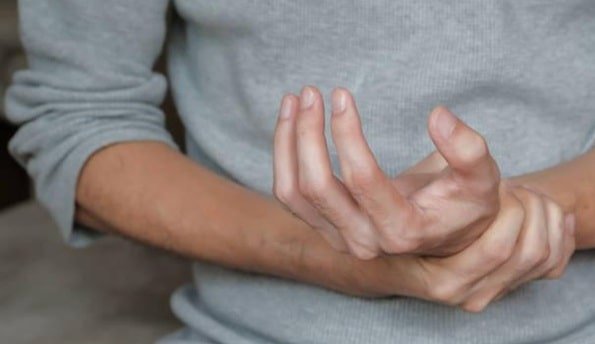“Nerve weakness” (nerve damage, or peripheral neuropathy) is a term used to describe nerves’ ability to reliably transmit signals to and from the brain and spinal cord to other body regions. Nerve weakness may result in symptoms of numbness, tingling, burning, weakness of muscles, or loss of coordination. Symptoms may develop over time, suddenly, or not at all depending on the cause and severity of the nerves’ involvement.
Having knowledge of what causes nerve weakness, and how it might be managed, is important for reducing discomfort, maintaining function, and improving quality of life. This article offers medically valid, evidence-based information on the causes and management of nerve weakness, in general.
What is Nerve Weakness?

Nerve weakness usually impacts the peripheral nervous system. The peripheral nervous system is the nerves outside of the brain and spinal cord. Nerve weakness can impact sensory nerves (which detect touch and pain), motor nerves (which control movement), or autonomic nerves (which control involuntary functions, e.g., digestion, heart rate). Nerve weakness itself is generally not a disease, but a complication, or symptom of another problem.
Some nerve supplements, like nurokind plus capsule containing methylcobalamin (a type of vitamin B12), alpha-lipoic acid, and pyridoxine (vitamin B6), may be appropriate for prescribed nerve health improvement. Treatment with supplements should only be applied based on clinical evaluation, and medical supervision.
Common Causes of Nerve Weakness
A number of health conditions, lifestyle factors, and external factors can potentially cause nerve weakness. There are many things that can cause peripheral neuropathy. Some of the most common include:
1. Diabetes Mellitus
One of the most common causes of peripheral neuropathy, diabetes mellitus. High blood sugar can damage nerve fibres, especially in the hands and feet. This can cause burning, tingling, and/or numbness, usually of the extremities.
2. Vitamin Deficiencies
Deficiencies in B vitamins—especially vitamin B1 (thiamine), B6 (pyridoxine), and B12 (cobalamin)—can cause nerve dysfunction. Vitamin B12 deficiency is well known to demyelinate, which affects conduction in nerves.
3. Alcohol Abuse
Chronic alcohol abuse is toxic to nerves and can also interfere with the uptake of essential nutrients. Alcohol abuse may lead to alcoholic neuropathy, which causes weakness, pain, and problems with balance.
4. Infections
Viral and bacterial infections can also damage peripheral nervous tissue. Specific examples of viral and bacterial infections that may cause peripheral neuropathy include shingles (herpes zoster), Lyme disease, HIV and hepatitis C.
5. Autoimmune Disorders
Autoimmune disorders are another cause of peripheral neuropathy and include Guillain-Barré syndrome, lupus, rheumatoid arthritis, etc. In autoimmune disorders, the immune system triggers the body to attack itself (nerve tissues).
6. Exposure to Toxins and Medications
Certain chemotherapeutic agents, heavy metals (lead, arsenic), and some antibiotics (tetracyclines) can lead to nerve damage. Evuexposure and overdosing can lead to irreversible nerve dysfunction.
7. Trauma and Nerve Compression
Weakness from trauma and/or compression from direct physical injury, repetitive strain injuries, and excessive pressure can result in the total or partial loss of nerve function. Common that may cause chronic nerve dysfunctions may result from carpal tunnel syndrome or herniated discs from compression of spinal nerves.
8. Genetic and metabolic disorders
Some hereditary conditions, like Charcot-Marie-Tooth disease, impact the structure and function of the peripheral nerves. Hypothyroidism or kidney disease may also result in secondary nerve injury.
Identifying Symptoms of Nerve Weakness
Symptoms can vary based on the nerves impacted and may include:
- Decreased or absent sensation to temperature, pain
- Tingling
- Muscle weakness or cramping
- Problems with proprioception or balance
- Sensitivity to touch or painful sensation from any normally non-painful stimulus
- Dropping things because of decreased grip strength (motor nerves)
If symptoms are present and persisting or worsening, further medical evaluation is needed to investigate the root cause.
Diagnosing Nerve Weakness
Doctors may assess nerve weakness with a combination of history, clinical examination, and diagnostic tests. Some examples of diagnostic tests include:
- Blood tests to rule out any vitamin deficiency, diabetes, infection, autoimmune process
- Nerve conduction studies and electromyography (EMG) – to assess electrical activity and functioning of muscles, and nerves
- MRI or CT-scan to assess structural issues or compression of nerve
- Nerve biopsy (rarely) to investigate nerve tissue
General Management and Supportive Care
Management of nerve weakness focuses on addressing any identifiable root cause, and supporting the nerve recovery where possible. Some examples of management privileges may include:
1. Treatment of Nutritional Deficiencies
Use of supplements of vitamins B1, B6, and B12 may assist in nerve repair if deficiency was the identifiable cause. A balanced diet should include lean protein, whole grains, leafy greens, and dairy or dairy alternatives that are fortified.
2. Glycaemic control in diabetics
Tight glycaemic control may slow the progression of diabetic neuropathy. Regular blood sugar testing, appropriate diet, physical activity, and medications where necessary are essential.
3. Pain management
Medications (over-the-counter or prescription) such as paracetamol, NSAIDs, and/or specific agents for neuropathic pain (e.g. gabapentin, pregabalin) may be of value. Topical creams for localized symptoms may include capsaicin and other pain relief (e.g. lidocaine) topical products.
4. Physiotherapy
Physiotherapy can assist with range of motion, strength, and coordination. Occupational therapy may assist with function of daily tasks if motor limitations impact activities of daily living.
5. Lifestyle changes
Reduced alcohol use, quitting smoking, and maintaining a healthy weight will ultimately promote healthy nerve function. Regular low impact exercise (walking, swimming, etc.) may improve circulation and symptoms.
6. Preventing any further nerve injury
This will involve protecting the affected limb(s) from traumatic injuries. If appropriate, use any assistive devices to minimise falls or pressure injuries.
Long-term Management
The recovery potential will depend on the cause and extent of the nerve injury. Some nerve injuries can improve with time and appropriate management, but others cannot. Early diagnosis and intervention can limit the extent of and facilitate improvements in quality of life.
Some combination supplements are occasionally utilised in supportive care for nerve health, such as Meganerv Forte Capsule 6, which is a combination of essential B-complex vitamins and antioxidants. These supplements should only be used as advised by your healthcare provider and only after a comprehensive assessment.

